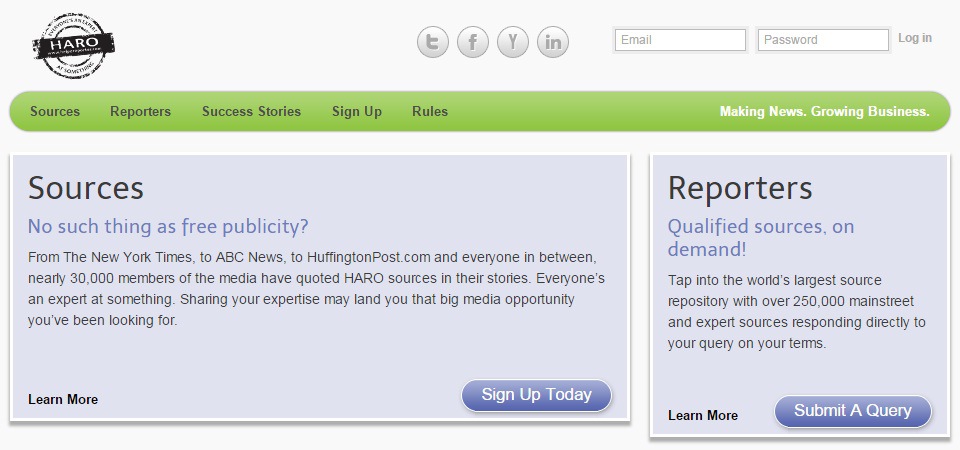So, the title sounds a little “click baity”, but it is what it is.
Everyone knows HARO can be a great way to some great publicity and not to mention some great links in the process. But not everyone knows there are some requests you might not want to reply to, or rather there are requests your client would want you to avoid sending them.
Given that HARO’s are very time sensitive make sure to take a look at some of the requests I’ve listed below and -more importantly- some items you’ll want to go over with your clients to make sure you are sending over the best request opportunities they can respond to quickly.
Requests That Could Spark Legal Issues
 Image credit: Giphy
Image credit: GiphyI’ve sent some HARO requests over that got kicked back for a variety of “legal reasons”. Some of which were:
- Live call-in interviews
- Topics on a sensitive subject
I get the live call-in interviews. Most copy that gets sent out gets reviewed by legal and doing a live call-in would most likely give a legal team a heart attack. While it may not seem like a big deal, you want to make sure you won’t say something that would land your company in hot water. Even then it would be good to ask if any kind of talking points or preparation could be done before the interview.
The sensitive subject matter, well I think those legal teams may be getting a little paranoid, but it ultimately comes down to not only what the client wants to do but what they feel comfortable with doing.
When a celebrity dies more often than not several HARO requests will come flying out of the wood works regarding the situation. If you have a client that happens to fall within that sector it would be a good idea to give them a call and see how they’d feel commenting on it or the issues surrounding the situation.
The last thing you should want to create is a PR fiasco for your client.
Requests From Authors Who Don’t Write for the Noted Publications
 Image credit: Tumblr
Image credit: TumblrThis is something I rarely see. But one of the things I look for is what publication will the response go to. If it’s a great fit for a client and a well known publication, it helps get a quicker response. A lesser known publication isn’t a deal breaker, but if someone claims to write for a place like Red Write Web or The New York Times, go see if they’ve already written something there.
Authors with an existing column have a greater chance at getting published than someone who is just “pitching” an article. Now that piece might get published somewhere else, which would be fine but you’d have to explain why that response your client sent didn’t go live on the publication they were expecting it to.
Requests That Explicitly Say They Won’t Mention You or Your Client’s Company
 Image credit: Photobucket
Image credit: PhotobucketAs I’ve stated, the reason most people/businesses do HARO’s is to get more visibility and hopefully a link out of it. That said, I have come across a few instances where the writer didn’t want the company mentioned. I responded to a request for the agency I worked for and it got published. They listed the information I sent and they mentioned me by name but as I read the other responses I noticed that other people had their companies listed. No links, but their companies were mentioned.
So I shot them a quick email about it (I was nice about it) and the article got updated. No link (nobody did other than their twitter profile), but just the company mention was good enough.
Fast forward a week or so and I noticed another request by the same company. I was excited. I knew what they liked and how to respond so I read what they were looking for. It was all good until I got to the last line “If you’re looking to promote your marketing firm, please don’t respond”. Now I get why they added this, and they did offer to link to a social media account. They didn’t want to link out to a potential competitor and just wanted to deter anyone that just wanted to promote their company.
But I have to wonder, if the sent response was genuine and good, why not give credit to where they work?
Not to mention, this is a question that could be asked by your client. Is your client okay with not getting their company mentioned, even though their employee would?
The only way I think this would make sense is if in the past they got requests to update company mentions/links because a person left and joined a new company. I know I’ve sent a few requests to places I’ve written when I changed jobs. So it might seem that any company the employee went to after their current job might get some credit.
While these points do speak to how a company can get publicity (or lack thereof), it does spark the question: How important is it for your company or your client to get mentioned? What’s a deal breaker for you? Is it potential legal issues that are going to cause a lack of response? Is it a writer that doesn’t write for the place they claim to? Or is it the fact that your company/client will not get a mere text mention?
P.T. Barnum has said, “Any publicity is good publicity.” But publicity, good or bad, has it consequences. Even if a client says they’ll answer/respond to anything, that doesn’t mean you should send them anything that comes up. When it comes to sending over HARO requests we should make sure we’re not only sending over the ones that they’ll reply to quickly, but also ones that would help them be seen in a good light.
Or does that matter?
What crosses the line for you when it comes to publicity?
Featured Image: Screenshot of HARO taken November 2014





